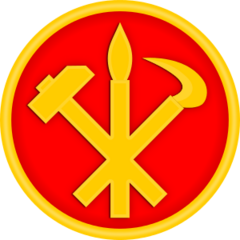Workers' Party of Korea
The Workers' Party of Korea is a Marxist–Leninist political party which is currently the ruling party of the Democratic People's Republic of Korea. It is currently lead by Chairman Kim Jong-Un.
Workers' Party of Korea | |
|---|---|
 | |
| Abbreviation | WPK |
| Chairman |
Kim Il-Sung (first) Kim Jong-Un(last) |
| Presidium of the Politburo of the Workers' Party of Korea |
Kim Jong-un Choe Ryong-hae Pak Pong-ju |
| Executive Policy Bureau of the Workers' Party of Korea |
Pak Kwang-ho Pak Thae-song Thae Jong-su Pak Thae-dok An Jong-su Choe Hwi |
| Founder | Kim Il-Sung |
| Founded | 10 October 1945 |
| Preceded by | Workers' Party of North Korea, Workers' Party of South Korea |
| Newspaper | Newspaper of the party |
| Youth wing | Kimilsungist-Kimjongilist Youth League |
| Membership | 4,000,000 (2007) |
| Ideology | Juche |
| Political position | Far-left |
| International affiliation | IMCWP |
| Colours | Red |
| Anthem | Long live the WPK! |
| Website | |
| http://www.rodong.rep.kp/en/ | |
History
The major figures and currents within the Workers' Party of Korea have their origins in the anti-Japanese army guerillas. These movements aimed to usurp a government friendly to Japanese businesses (and the influential Japanese armies that garrisoned them) and then substitute them with a revolutionary domestic alternative to the exploitation and the imperialism of Japanese capital. The Workers' Party was the product of a number of these movements coming together and taking the final step into organizational unity on the tenth of October 1945. The major armies were products of the Korean peasants and working class, the Korean refugees and diaspora community based in the Soviet Union, as well as the Koreans participating in the second United Front during the Sino-Japanese War.
Juche
Juche (English: self-reliance) is an ideological program born of the international pressures and experiences of the Korean revolution. Derived from Marxism–Leninism, Juche diverges theoretically in its emphasis of economic self reliance and militarism in the face of isolation:
Our party is leading socialist and communist construction to victory by establishing the system and method of leadership over the revolution and construction, in keeping with the country’s actual conditions on the basis of Marxism-Leninism and the Juche idea... In view of the country’s specific conditions and the demand of the revolution, our party set forth the policy of building a mass based party and widely recruited progressive workers, peasants and working intellectuals, which helped it in expanding its ranks rapidly. It continued to consolidate its ranks organizationally and ideologically in the fierce struggle against the internal and external enemies.
— Advance Under the Banner of Juche and Marxism–Leninism[failed verification]
Organization
Per Article Five of Chapter One of the Democratic People's Republic of Korea's constitution, society is to be organized along the lines of democratic centralism. Local party offices federate into regionals, regional into provincial and then on to national. The legislative branch (the Supreme People's Assembly) the most powerful branch of the Korean state is composed of the following demographics: 37% directly pooled peasants and workers, 10% directly pooled cooperative farm workers, 53% elected officials. Where Korean government differs organizationally from traditional governmental models is the prominence of the military in governing.[citation needed] The Korean People's Army is given immense importance under Songun ideology and serves as a grassroots paramilitary organization that holds internal elections.
Leadership
The role of party leadership and representation is thought to be an important one. The chairman of the Workers' Party of Korea is appointed by the Supreme People's Assembly and is their direct subordinate. The office of Supreme Leader is enshrined as ideological leadership in inspiring movement along the road of socialism.